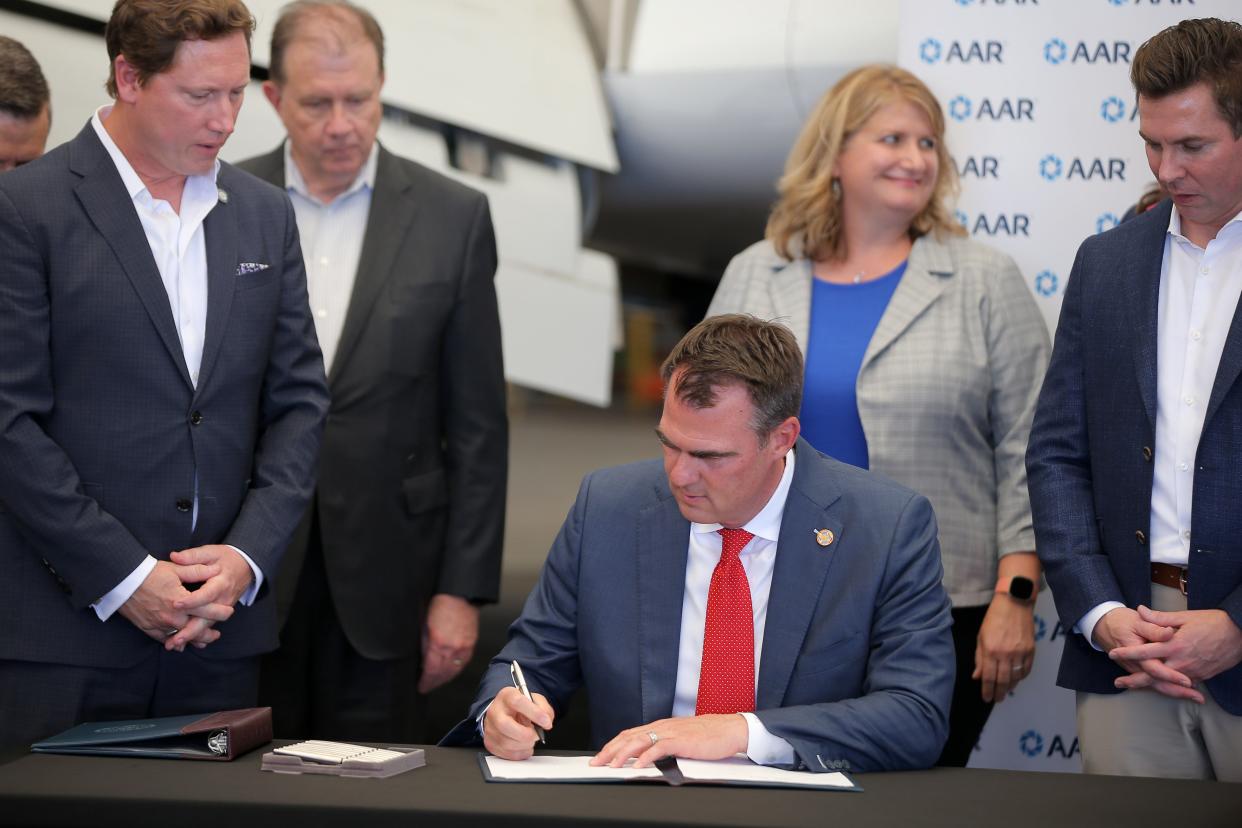Governor celebrates new workforce commission that has raised transparency concerns

- Oops!Something went wrong.Please try again later.
A new entity with hopes of improving workforce shortages in Oklahoma was officially signed into law Wednesday by the governor, creating a nine-member commission that critics have called a “shadow government.”
Inside a hangar at Will Rogers World Airport — a nod to the challenge aerospace firms have in finding trained workers — Gov. Kevin Stitt signed Senate Bill 621, creating the Oklahoma Workforce Commission.
The nine members of the commission will be made up of business leaders appointed by the governor and legislative leaders and will be tasked with coordinating and funding programs designed to create more skilled workers.
“As we are recruiting companies we hear over and over again that it’s all about workforce, (companies want to know if) they can get the workers that they need,” Stitt said Wednesday.
The new commission was a priority for the State Chamber, which said its members continue to struggle with a lack of skilled workers in fields like health care, technology and aerospace.
“We’ve got work to do, but today is a good step in solving some of those issues,” said Chad Warmington, president and CEO of the State Chamber, who predicted commission members will begin their work by the end of summer.
More: Oklahomans can get free help clearing criminal records at the annual Expungement Expo. Here's how
Workforce bill faced opposition in the Oklahoma Legislature
The bill’s prospects were in doubt last month as the House needed a second vote to advance the measure.
Bipartisan concerns were raised that the new entity would not have enough oversight and could become a taxpayer-backed slush fund for business leaders. The commission will receive state tax dollars, including $5 million in federal pandemic relief funds.
“We give them a big pot of money, they are allowed to write their own rules, they hire their own employees without any cap on how much they can spend ... and they write their own contracts,” said Rep. Andy Fugate, D-Oklahoma City, who voted against the bill. “What we are creating today is a shadow government.”
More: Why regulation of Oklahoma chiropractors will continue despite governor's veto
But Stitt said he wasn’t concerned about the private nature of the new commission, which will operate independently of any state agency.
“By creating one entity where it all flows through, where all those dollars flow through, we felt (this commission) could be more responsive to the business community,” Stitt said.
The governor has aggressively pushed for the privatization of various aspects of state government, some resulting in investigations of financial mismanagement, including when he hired a private company to disburse pandemic relief funds for students and when the former tourism director signed contracts with a restaurant chain without any oversight by the agency’s commission.
Critics of the workforce commission predicted it could become another source of scandal.
“We are in some ways setting up a risk here,” said Rep. Cyndi Munson, D-Oklahoma, who expressed concern that the commission will be able to receive donations.
More: It could take weeks to override Gov. Stitt's vetoes of tribal compact extensions. Here's why.
Business recruitment is a major focus for governor
Democrats argue the governor’s vocal opposition to the LGBTQ+ community and Oklahoma’s ban on abortion has done more to stunt the state’s ability to attract new workers.
Earlier this year, Volkswagen rejected tax incentives to build a new facility in Oklahoma, partly over the state’s opposition to "environmental, social and governance" policies, which are embraced by many large corporations.
But supporters of the workforce commission said it was a way to help Oklahoma compete with other states that have taken similar steps.
“I ran on one simple idea. I wanted to make sure your kids and grandkids, my kids and grandkids don't move to Texas to find a better job,” said Rep. Brian Hill, R-Mustang, who coauthored SB 621. “The workforce gap is the largest issue facing us as a state.”
This article originally appeared on Oklahoman: Gov. Kevin Stitt signs Oklahoma Workforce Commission into law

